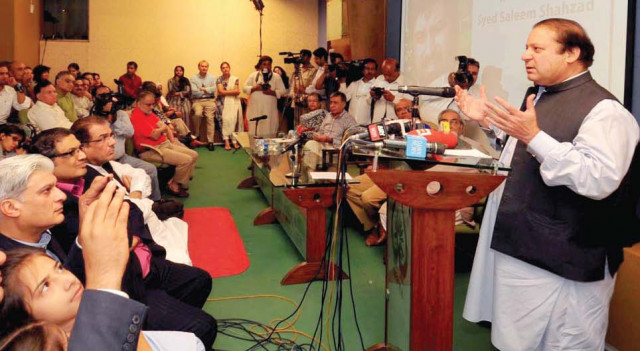Nawaz Sharif and the military establishment
PML-N leader has spoken out in defence of an aspect of democracy that has gone missing in Pakistan.

Since the SAFMA reference was about the death of a journalist with clues pointing to some elements in the establishment, Mr Sharif urged the Supreme Court to take notice of the killing, pledging that he and his party would stand with the journalist community “till the killers are brought to book”. Given that a campaign is on to muffle the public protest against the killing of Saleem Shahzad, the PML-N leader has spoken out at the right time and in defence of an aspect of democracy that has gone missing in Pakistan.
The positive side of the PML-N policy is its steady adherence to the strategy of normalising relations with India as a corollary of its stance on Pakistan’s status as a nuclear power. The unspoken rule in nuclear theory and practice is that after having achieved nuclear deterrence, two rival states must achieve agreement on status quo. Mr Sharif’s reference to Kargil was actually aimed at conveying the fact that the Pakistan Army was wrong to pursue conflict — overt or covert — after the 1998 nuclear testing by Pakistan when he was prime minister.
Stemming from the PML-N’s adherence to the 2006 Charter of Democracy signed with the PPP, its policy plank of seeing with India goes against the continuing India-centrism of the GHQ, abhorred by the international community and diagnosed by it as the root of the strategic mismatch in the war against terrorism. This is also the fatal bedrock on which the GHQ is isolating Pakistan in the world, confirming the impression that some elements with the Pakistani state are interfacing with al Qaeda instead of fighting it.
This is not the first time that Mr Sharif has expressed his determination to continue his post-1998 policy with India. His repeating it on June 10 points to the dynamic nature of his thinking often identified by his opponents with policy contradiction. The effort to remove Pakistan from the rut of isolationism apparently contradicts his party’s position that the war against terrorism is not Pakistan’s war. If the PML-N wants the GHQ to relent on India and thus ensure Pakistan’s nuclear deterrence, it will have to own this war — the journalist Mr Sharif came to SAFMA to defend died saying Pakistan was wrong in not owning this war. As the PML-N policy stands today, it persuades one to focus on the various unexamined aspects of its relationship with the army. When it says the war against terrorism is not our war, it is getting cosy with the elements in the armed forces sympathetic to the cause of the extremists willing to interface with al Qaeda. Less directly, its rather strident expression of anti-Americanism also allows it to retain its influence within the rank and file of the army. Since Mr Sharif has criticised the current military leadership rather than the institution itself, one must understand PML-N’s anti-Americanism as a less permanent part of its domestic rivalry with the PPP with whom it expects to contest the next elections.
Mr Nawaz Sharif knows that his right-wing party has more traction within a Punjabi-dominated army than the PPP. Everyone else knows that only his party can achieve normalisation with India to clinch the war against terrorism. The world outside is also realising this.
Published in The Express Tribune, June 12th, 2011.














COMMENTS
Comments are moderated and generally will be posted if they are on-topic and not abusive.
For more information, please see our Comments FAQ